MICHELLE FREEMAN THE WOMAN WHO RAN TOO FASTA glimpse inside the world of track and field superstar Michelle FreemanBy Kim Goss Published: Winter 2002 Michelle Freeman is a track and field athlete who runs too fast. Seriously. She's a world-record hurdler who was ranked number one in the world in 1997 and made the finals of the Olympic Games, but paradoxically, she is just too fast for her event. “You can run only as fast as your technique will allow,” says Freeman's coach, Beverly Kearney. “Hurdling is a more technical event than sprinting, and Michelle's speed makes it even more difficult for her because there's only so fast you can go between barriers. Michelle is really explosive, and sometimes her competitiveness gets the best of her and as a result she doesn't execute technically as well and the speed takes over.” An example of what Coach Kearney is talking about occurred during the Challenge of Champions Race held on June 1, 1997. In this special event in which superstar athletes were pitted in one-on-one competitions, a primed Freeman faced reigning Olympic champion Ludmila Engquist of Sweden. Freeman had an explosive start, and at sixty meters it seemed she would win easily by several steps. But as the race progressed, her technique faltered, and this allowed Engquist to overtake her in the last 30 meters to win 12.82 to Freeman's 12.96. In addition to losing ground to technique, Freeman had been finding it difficult to stay healthy. Coach Kearney remarks, “The hurdles are an extremely violent event in terms of the demands it makes on the body, more so than straight sprints." In fact, so stressful are the hurdles that at one competition Freeman hit the sixth barrier and broke both her left tibia and fibula, injuries that took considerable time to heal. Consequently, Freeman's plan is to switch from the hurdles to the 100-meter sprint. “Michelle could have been as successful or even more successful in the sprints as she has been in her career as a hurdler,” says Kearney. With a best time of 11.1 in the 100 meters, Kearney is excited about Freeman's potential. “We're hoping by focusing on the 100 meters she'll be able to run sub-11 seconds, which will put her in the finals and hopefully in position to medal. She's never explored her full capabilities in the sprints, and before she retires, she wants to find out what she can really do.” Power to Spare Born in Jamaica, Freeman moved to the United States in 1989. She started as a sprinter in high school, but became intrigued by the hurdles. Says Michelle, “The first time I tried the hurdles, I remember the coaches saying, ‘This is not for you!’ But I found the hurdles more interesting than the sprints, so I decided to stay with them.” After high school Freeman accepted a scholarship to the University of Florida. During her senior year in 1992, Michelle was part of a Gator team that won the Indoor and Outdoor Southeastern Conference (SEC) Championship, the NCCA Indoor Track and Field Championships, and took second in the NCAA Outdoor Track and Field Championships. Freeman's best meet in college was the 1992 SEC Indoor Championships, where she won the Commissioner's Trophy for being the highest scorer in the meet, earning 30 of Florida's 139 points. She won the 55-meter hurdles (7.36) the 55 meters (6.69) and the 200 meters (23.56); and in the semifinals she broke the world record with 7.34 in the 55-meter hurdles (a time that to this day has been exceeded by only three athletes). The Gator coach was Beverly Kearney, who moved to Texas in 1992 to accept the position as Head Coach at the University of Texas in Austin, where Freeman would later follow. It's an understatement to say that she is impressed by Freeman. “If you could every watch Michelle train, her intensity is such that it's inspiring.” Although many track athletes do not like indoor competitions, Freeman loved it. “For me, running indoors is not a bad thing, it's something that I enjoy.” However, after she graduated from college she switched her focus to outdoor competitions and set her goals for the World Championships and the Olympics. The specialization paid off. Freeman's best time in the 100 meter hurdles is 12.52, which ranked her number one in the world in 1997. She has also run a wind-aided time of 12.40. The current world record is 12.21 by Yordanka Donkova of Bulgaria. A Champion's Training As early as high school, Freeman has always included weight training in her conditioning program. Her core lifts, even throughout college, have been squats, snatches, cleans and clean and jerks. Auxiliary lifts include box squats and leg curls. She says she was taught from the beginning of her running career that the best weight training programs for her event would focus on the Olympic lifts, because they develop power, and squats, because they develop basic strength. After the 1999 World Championships, Freeman sought the help of Canadian strength coach Charles Poliquin, whom she says helped her immensely with her lifting techniques. Coach Poliquin says Freeman is one of the most amazing athletes he has ever trained, as evidenced by her best lifts of 264x2 in the power clean, 375x3 in the parallel squat, and five reps in the parallel grip chin-up with 66 pounds strapped to her waist! Asked about how Freeman's strength level compares to other sprinters and hurdlers, Kearney replied, “Michelle is probably ahead of about 95 percent of them. She's extremely strong and extremely explosive naturally, and the weight program has enhanced those qualities.” Another part of her training has been massage. For this, she praises Dr. Keith Pyne, who was able to work on Freeman when he lived in Dallas. Using a therapy called Active Release Treatment Techniques® (ART), Pyne was able to help Freeman avoid injuries and increase the intensity of her training. “What I would do with Michelle is not so much treat injuries, but make sure her gait patterns and kinetic firing patterns were in proper order to maximize her ability to perform. Active Release helps break up the fascial planes and scar tissue that would form from the stress of being an athlete at that level.” At the 1996 Olympics, Freeman channeled her great focus while maintaining proper sprint mechanics to place 6th in the 100-meter hurdles. Now this powerful athlete is focusing on the next 2004 Olympics. Michelle Freeman looks forward to pulling out all the stops and running as fast as she can to claim her goal: the title of Fastest Woman in the World.ichelle Freeman is a track and field athlete who runs too fast. Seriously. She's a world-record hurdler who was ranked number one in the world in 1997 and made the finals of the Olympic Games, but paradoxically, she is just too fast for her event. “You can run only as fast as your technique will allow,” says Freeman's coach, Beverly Kearney. “Hurdling is a more technical event than sprinting, and Michelle's speed makes it even more difficult for her because there's only so fast you can go between barriers. Michelle is really explosive, and sometimes her competitiveness gets the best of her and as a result she doesn't execute technically as well and the speed takes over.” An example of what Coach Kearney is talking about occurred during the Challenge of Champions Race held on June 1, 1997. In this special event in which superstar athletes were pitted in one-on-one competitions, a primed Freeman faced reigning Olympic champion Ludmila Engquist of Sweden. Freeman had an explosive start, and at sixty meters it seemed she would win easily by several steps. But as the race progressed, her technique faltered, and this allowed Engquist to overtake her in the last 30 meters to win 12.82 to Freeman's 12.96. In addition to losing ground to technique, Freeman had been finding it difficult to stay healthy. Coach Kearney remarks, “The hurdles are an extremely violent event in terms of the demands it makes on the body, more so than straight sprints." In fact, so stressful are the hurdles that at one competition Freeman hit the si |
 |
|
Michelle Freeman at the 1996 Olymic Games in Atlanta |
 |
|
While at Florida in 1992, Freeman broke the world record with 7.34 in the 55-meter hurdles (a time that to this day has only been exceeded by three athletes). |
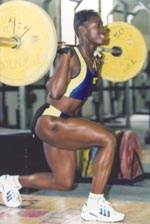 |
|
Freeman doing lunges, an excellent auxiliary exercise for strength and balance. |
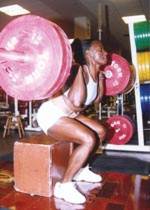 |
|
Strength Coach Charles Poliquin says Freeman is one of the most amazing athletes he has ever trained, as evidenced by her best lifts of 264x2 in the power clean, 375x3 in the parallel squat, and five reps in the parallel grip chin-up with 66 pounds strapped to her waist! |
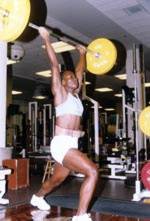 |
|
|
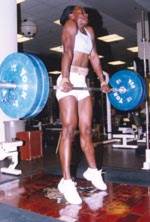 |
|
|
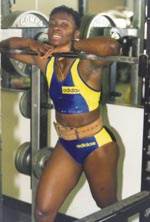 |
|
Michelle Freeman |